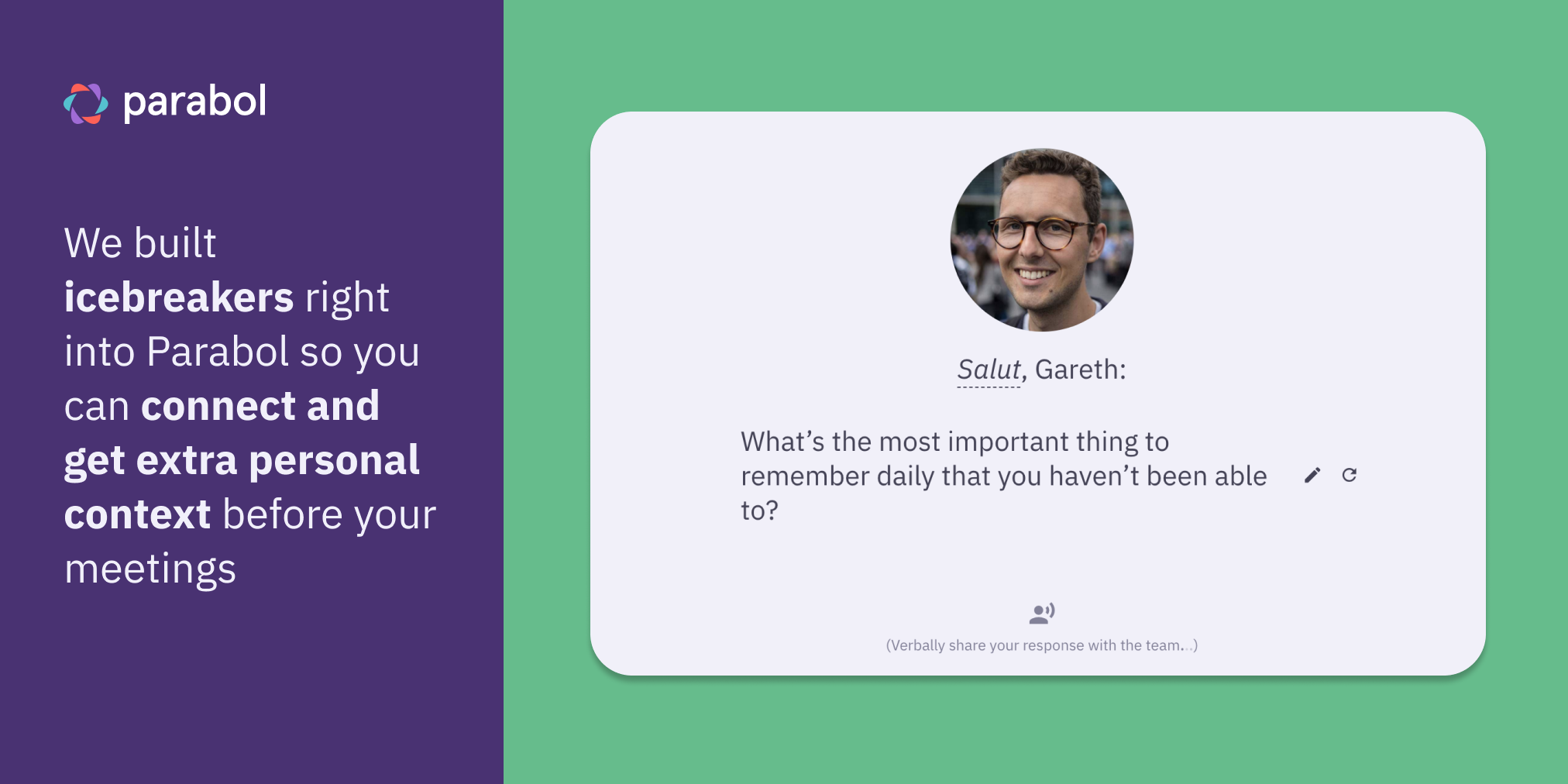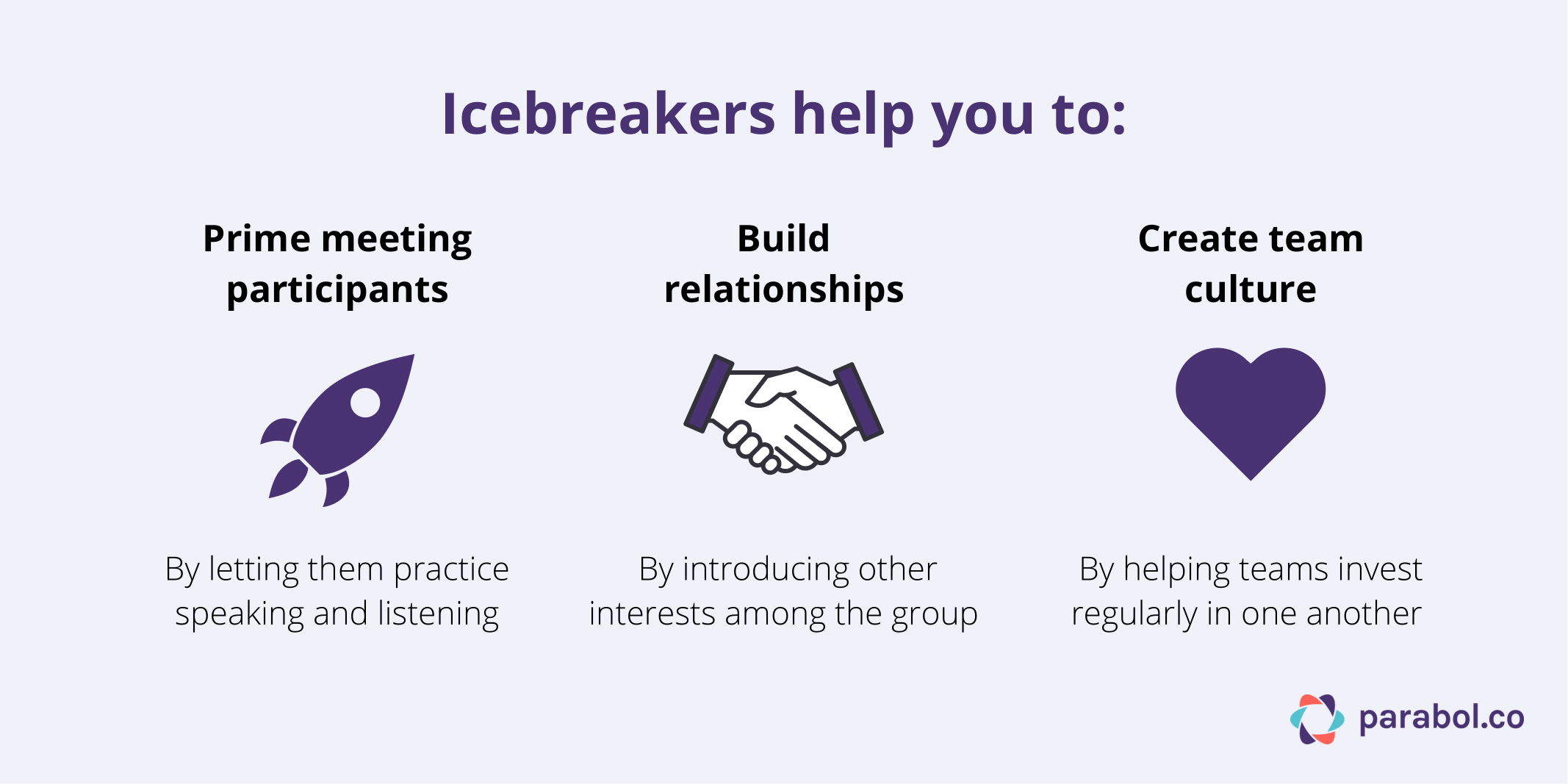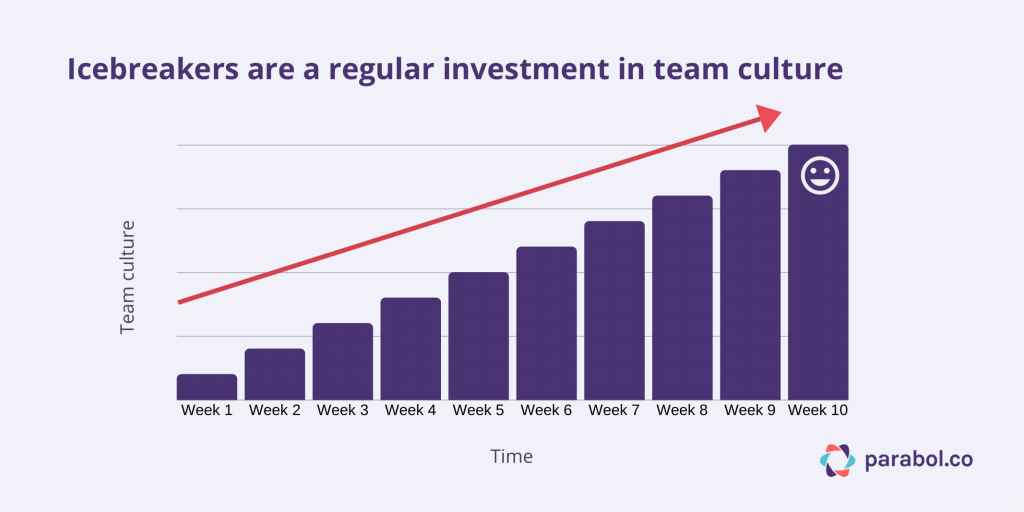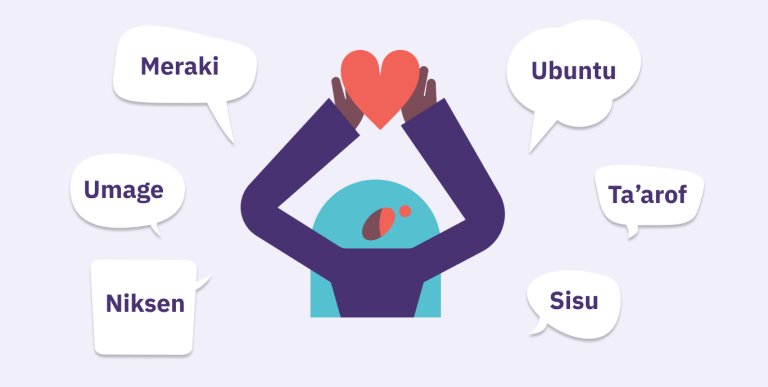Icebreaker Questions: Why They Matter

When you think of icebreakers, what comes to mind?
Unfortunately, for me, it’s often awkward events or team-building activities where a plucky facilitator forces everyone to unwillingly disclose a ‘fun fact’ about themselves.
But icebreakers don’t need to make you cringe.
With a team you already know pretty well, starting off meetings with icebreakers can help you build stronger bonds, find uncommon points of interest, and have more productive meetings.
In this article, we’re covering some of the reasons why icebreakers might be coming back in fashion, and the benefits of running them.
What is an icebreaker or social check-in?
A social check-in or icebreaker is an opportunity at the beginning of your meeting or retrospective to connect with each other by asking and answering a question.
It’s really as simple as that.
During a social check-in, the moderator will ask the whole group to answer a question. This should be something fun and engaging. The question should be something everyone can answer, and it shouldn’t leave anyone feeling exposed.
But having a regular social check-in is a bit different to the icebreaker you’re used to.
In many seminars or workshops, icebreakers are used to help people form useful associations that aid memory. Instead of trying to remember a series of new names and faces, you can associate them with a third piece of human and relatable information. And those pieces of information are usually great conversation starters too.
But when teams already know each other and work together, social check-ins are like meeting-specific icebreakers that help set the tone of the meeting rather than getting you to remember everyone.
If you are running your meeting or retrospective with a broad range of stakeholders you can be more flexible and treat the check-in more like a traditional icebreaker.

Instead of helping you remember the names of your colleagues (we sincerely hope that’s not a problem 😅), social check-ins build team cohesion and awareness of your team-mates’ personal contexts.
Why social check-ins are important
A cold open might work great on a show like Saturday Night Live, but it’ll rarely be as effective in your meetings.
That’s because humans are social creatures: we need to connect with each other and know we are safe before we can open up.
There are three main reasons why social check-ins and icebreakers are important:
- Priming meeting participants
- Building relationships
- Creating your team or organizational culture.

Icebreakers prime meeting participants by letting them practice speaking and listening
Ever been in a meeting where the same three people always seem to be speaking? Sometimes it’s hard to even get a word in. Other times, you might feel that your contribution just isn’t worth the time.
And when a few people dominate the conversation, it’s difficult for meeting leaders to get introverted team members to feel safe speaking up.
Social check-ins are meant to mitigate those scenarios and ensure everyone is communicating and listening to each other.
If you speak once in a meeting, you are statistically much more likely to speak again. Social check-ins are important because give everyone a chance to speak on an equal footing at the start of the meeting.
Icebreakers make sure everyone is included. Right from the start.
Good icebreaker questions not only get everyone speaking, they also prime everyone to listen. Introverted team members are empowered to speak, and extroverted team members are encouraged to listen.
When everyone listens to each other, meetings are more fruitful and people treat each others’ opinions with more respect. That’s because social check-ins help us recognize that everyone has something to contribute.
An academic study has showed that ice-breaking at the start of a meeting or project has a positive impact on team interaction and skill acquisition. Teams that had carried out icebreakers had retained more information and performed better on individual exams at the end of the study.
Priming your team members in this way can help them work together smarter!
Social check-ins help build relationships by introducing other interests among the group
A few years back I worked remotely with a colleague on a bunch of different projects. We spent a lot of time working together, and our working relationship was great. For all our work, I didn’t know much about him as a person. Our relationship was built on our shared interest in getting projects finished.
I’m sure this is a pretty common scenario. Academics call this a ‘simplex’ relationship, consisting of one mutual point of interest. We just wanted to get the work done.
But having a regular social check-in can reveal aspects of your colleagues you would never know about. The more you know about your colleagues, the stronger your relationships become. Teams built on strong relationships are more open, more honest and more effective.
Psychological studies have shown that people actually want to have more than one reason for connecting to another person. So the more connections you can make, the stronger your relationships will be.
These ties are what academics call ‘multiplex’ relationships. Multiplex relationships involve stronger bonds that can translate into closer working relationships.

Good icebreaker questions help everyone in the room feel valued as humans with diverse interests, not just workers who are there to do a job. And that has a huge impact on team performance.
Many teams have busy weeks, and usually there isn’t time to start asking people deep questions that reveal a different side of their personality. Social check-ins are a time set aside specifically to build those connections.
Social check-ins are important because they help you to:
- Know your colleagues’ interests
- Understand their values
- Build emotional intelligence
- Discover commonalities
- Work better together
Over the course of history, humans have found many different ways to ice-break.
A study by researchers at the University of Oxford found that having an ice-breaker – specifically singing – resulted in an endorphin release that helped the group to bond much more quickly compared to when there was no singing.
We don’t get up to much singing at Parabol, but we do have a social check-in for all of our retrospectives and check-in meetings. And we’ve built that into our tool. We’re a fully remote team, so having an icebreaker is a really important way for us to build strong bonds despite being distributed around the world.
Icebreakers are an effective way of building relationships because they force us to reveal a piece of ourselves. They make us momentarily vulnerable before others, which is how humans bond with each other and feel safe and accepted.
Icebreakers shape team culture as team members invest in one another regularly
Meetings are highly ritualized events. That’s why it’s important to build the right habits from the very beginning. Social check-ins or icebreakers should be part of your ritual because they help you to build a team culture.
Teams with a shared culture have shared values, shared methods of doing things, and a shared understanding of each other. But building a culture requires investing in your team.
Think about your team culture like a savings account. At the start of your meeting every week, you invest a small amount of your time doing a social check-in. The more you regularly invest in social check-in and stack that time up, the more relationships within your team grow.
A few months down the line, you recognize that the small amount of time you invested every week has helped you build a culture of active listening, open participation and shared purpose. Icebreakers inject some humanity into your team culture!

Once the social check-in becomes a part of your meeting ritual, you’ve started building a culture. The practice of ensuring everyone contributes, everyone listens, and everyone respects each other just becomes ‘the way we do things around here’.
American psychologist Bruce Tuckman wrote extensively on culture forming and the dynamics of small teams. In the mid-60s he came up with his four phases of group development: Forming, Norming, Storming and Performing.
Making a small investment in social check-ins every week can help you fast-track through Tuckman’s stages of development. How?
Icebreakers are part of the ‘norming’ process because they are regular team rituals that quickly become norms.
The turbulence of the ‘storming’ period, which Tuckman understood as a time of tension, can be smoothed-over by icebreakers. Icebreakers build a culture where people are encouraged to be open and honest, which prevents frustrations being expressed in a toxic way that can hurt feelings or damage relationships.
By sharing pieces of yourself every week, team members better understand your values and limits, which reduces harmful conflict. All of this leads you more quickly to Tuckman’s ‘performing’ stage, where teams can reach their potential.
Running a social check-in is one of the best ways of ensuring continuous team improvement. All you need to do is invest a few minutes at the start of every meeting!
Get started with our huge list of icebreaker questions for team meetings!
Conclusion
You’re ready to start investing in your team relationships and culture!
Let’s quickly recap all the key points we discussed.
Social icebreakers are a time for you to connect personally with your team members before you start your meeting.
They’re important because they help you prime everyone to contribute and listen, they help you and your team build strong ‘multiplex’ relationships with each other, and investing in social check-ins helps you build a team or company culture.
Remember that social check-ins are an investment in your team. A few minutes of investment in every meeting can deliver dividends in team synergy, efficiency and culture, for years.
Cultures aren’t built through mission statements, internal policies, or abstract leadership ideas, but by the everyday actions of people in your organisation.
-1.png)
So, let’s get to it!
Got some great icebreaker questions?
Let us know by sending a note: Contact








